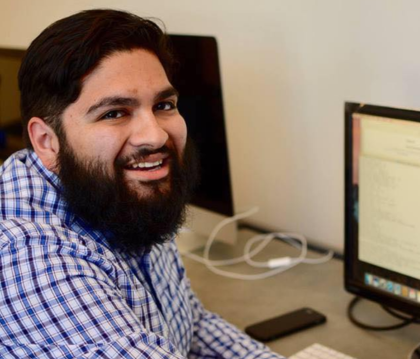 UC Merced graduate and first-generation college student, Vicente (Vince) Ramirez, has charted an inspiring path from the Central Valley to the forefront of chemosensory research. Growing up in Tracy, California, he initially pursued molecular biology but discovered a passion for genetics and evolution while working in Stephen Wooding’s lab. His research on taste receptor genes led him to a PhD in Public Health at UC Merced, where he explored the genetic basis of chemosensory perception and its implications for health and behavior.
UC Merced graduate and first-generation college student, Vicente (Vince) Ramirez, has charted an inspiring path from the Central Valley to the forefront of chemosensory research. Growing up in Tracy, California, he initially pursued molecular biology but discovered a passion for genetics and evolution while working in Stephen Wooding’s lab. His research on taste receptor genes led him to a PhD in Public Health at UC Merced, where he explored the genetic basis of chemosensory perception and its implications for health and behavior.
During his graduate studies, Vince investigated how genetic variation influences taste perception and dietary choices. His research evolved to examine broader public health concerns, such as the impact of air pollution on smell and its connection to neurodegenerative diseases. When COVID-19 emerged, causing widespread taste and smell loss, he became deeply involved in studying chemosensory disorders, positioning himself at the intersection of genetics, neuroscience, and public health.
Beyond research, he was actively engaged in the UC Merced community. As an undergraduate, he contributed to student life through Sigma Chi Fraternity, managing philanthropic and academic initiatives. As a graduate student, his focus expanded to professional development, securing a summer fellowship at the Department of Energy Joint Genome Institute, through an NIH supplement award for training at the Monell Chemical Senses Center, and joining the Global Consortium for Chemosensory Research. Among his most fulfilling experiences was teaching and connecting with students who shared similar backgrounds.
Now a postdoctoral research fellow at the Monell Chemical Senses Center in Philadelphia, he continues to explore the role of smell and taste as early indicators of disease. His goal is to develop public health strategies that integrate chemosensory testing into broader health assessments. Looking ahead, he aspires to a tenure-track faculty position where he can further his research, teach, and mentor the next generation of scientists.
His advice for future students: "Your journey through science is hardly ever a solo endeavor. Surround yourself with people who encourage your growth, and never hesitate to seek new opportunities—sometimes, all it takes is asking."




